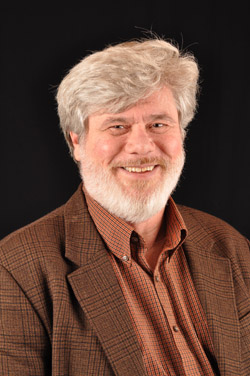By Madison Mathews
Johnson City Press
 MILLIGAN COLLEGE (Oct. 17, 2011) — When most people talk about being bitten by the acting bug, it’s based on an experience from performing in a school play at a young age. That wasn’t the case for Richard Major.
MILLIGAN COLLEGE (Oct. 17, 2011) — When most people talk about being bitten by the acting bug, it’s based on an experience from performing in a school play at a young age. That wasn’t the case for Richard Major.
Before graduating from Milligan in 1976, Major was cast in a production of the musical “Godspell.” The experience of acting in the musical is ultimately what led Major to embark on a career in theater that has lasted for nearly 30 years — 26 of which have been as Milligan’s professor of theater.
“After I performed in that play, I just decided theater is what I’m going to do for the rest of my life,” Major said. “I guess, really, for the first time in my life, I had real passion in my life and it’s pretty much been that way ever since.”
For someone who changed his major numerous times, deciding to finally pursue a degree in theater was a major turning point in Major’s life. Like many actors, Major was drawn into the world of theater because it finally gave him a voice.
“I knew there was always something I wanted to say somehow. I wanted to be able to express myself in some way, but I just didn’t have the vocabulary to do it. When I found the theater, I suddenly had a way through a playwright’s words to express things that I felt very deeply about,” he said.
Major, a native of Portsmouth, Ohio, transferred to Milligan College in 1973 from Ohio University. He was one of the last students to graduate from Milligan with a speech in theater degree. Following graduation, Major directed a couple of shows at Milligan before marrying his wife Karen Brewster, who teaches theater courses at East Tennessee State University, in 1979.
They left the area and attended graduate school at Michigan State University, where Major pursued a master’s degree in acting and Brewster pursued a degree in costume design. After completing the program at Michigan State in 1982, Major and his wife moved to Nebraska where they began working at different theaters.
During the fall of 1982, Major began touring with Nebraska Theater Caravan, which traveled around the country performing three shows geared to different age groups.
“All of the shows were really well-received. The show that really got us into larger cities for a really lovely tour in the late fall was ‘A Christmas Carol.’ During that tour, we played big houses like the Ohio Theater, the Heinz Hall for Performing Arts in Pittsburgh and had really interesting audiences. It was a good experience,” he said.
The Caravan was devoted to doing theater for young audiences, which Major really enjoyed. The focus on theater for young people was something that Major would grow when began teaching at Milligan with the Theater for Young Audiences program.
Major and his wife had moved back to Abingdon, Va., where they worked with the Barter Theatre. While there, Major received word that Milligan was in search of someone to take over the theater program.
In 1985, Major began his long career as professor of theater at Milligan.
“At the time, I thought, ‘OK, this is a one year gig. This will give me time to figure out where I want to go next, and I’ll be able to earn a little bit of money,’ ” he said.
After playing around with the idea of leaving Milligan, Major finally decided just to stay put in 1987, the year he directed a production of “Children of a Lesser God,” which he said really opened his eyes into what theater at Milligan could do.
“What I realized then was that it didn’t really matter where I was, I could do good theater wherever and I can work with really quality students here at Milligan,” he said.
One of the exciting things for Major during his time as a professor at Milligan has been watching the theater program and other fine arts continue to grow.
For a department that spent many years without a performing space, Milligan’s theater department now has a place to call home in The Elizabeth Leitner Gregory Center for the Liberal Arts.
In addition to seeing the program grow and crafting original works, such as “The Gospel According to Jazz,” Major’s favorite aspect of being at Milligan is working with the students and watching them grow.
“It makes me feel so good that I was able to some way share a passion with students, but then now they’re sustaining that passion now and very, very happy with the creative work that they’re doing,” he said.

